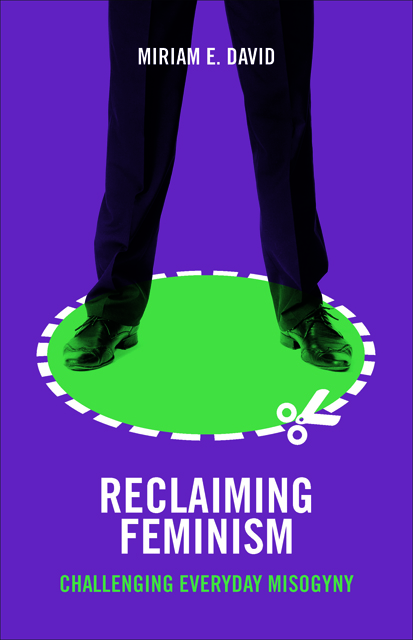Book contents
- Frontmatter
- Contents
- About the author
- Acknowledgements
- A note about the waves of feminism
- one Feminist reflections on a lifetime in academe
- two Changing feminism
- three Feminist pioneers
- four Gender and generations
- five Cultivating feminists
- six A feminist resurgence
- seven Feminists on campus
- eight Feminist fortunes
- References and select bibliography
- Index
two - Changing feminism
Published online by Cambridge University Press: 15 April 2023
- Frontmatter
- Contents
- About the author
- Acknowledgements
- A note about the waves of feminism
- one Feminist reflections on a lifetime in academe
- two Changing feminism
- three Feminist pioneers
- four Gender and generations
- five Cultivating feminists
- six A feminist resurgence
- seven Feminists on campus
- eight Feminist fortunes
- References and select bibliography
- Index
Summary
I now explore facets of the changing cultural, socioeconomic and political contexts over the last 50 years. Feminist methods of study have been created with the development of substantive knowledge, within the social sciences or social and educational history. These methods draw on those in the arts and social sciences, although there is a question about which came first. But let’s not be detained by debates about the chicken and the egg; suffice it to say that ideas about using narratives as ways of gleaning wisdom about the lives of others, women especially, has become an acceptable approach of what became known as ‘the biographic turn’ in the late 1980s. It had been prefigured in the developing methods of the social sciences in the postwar period. While these ideas remain contested, they remain critical to feminist studies.
I also provide some statistical evidence about changing demographic trends of university education, starting with the UK, by contrast with the US and other European countries. It is clearly the case that HE, like feminism, is far more prominent in public life and employment than 50 years ago. It is also more prominent in global economies, leading to the notion of knowledge economies. As already mentioned, in 1963, the then UK Conservative government received a major report into HE, which it immediately accepted. This report, the Robbins Report, was the subject of much public and policy discussion in 2013, given the celebrations for its 50th anniversary. I revisit its details to set the scene for subsequent discussions about women’s changing lives and the consciousness of feminist ideas.
Lord David Willetts, elevated to the House of Lords in the Dissolution Honours of August 2015, was the former UK coalition government’s Conservative Minister for Universities and Science (2010-15). In Robbins revisited: Bigger and better higher education, he reviewed the report, producing a very useful summary (Willetts, 2013). To identify the changing balances between men and women as undergraduate students, he had the figures carefully re-analysed. In 2013 there were 54% female undergraduates as opposed to 46% male undergraduates, whereas ‘in the 1960s only 25 percent of full time students at UK institutions were female’ (Willetts, 2013, p 26).
- Type
- Chapter
- Information
- Reclaiming FeminismChallenging Everyday Misogyny, pp. 27 - 52Publisher: Bristol University PressPrint publication year: 2016

